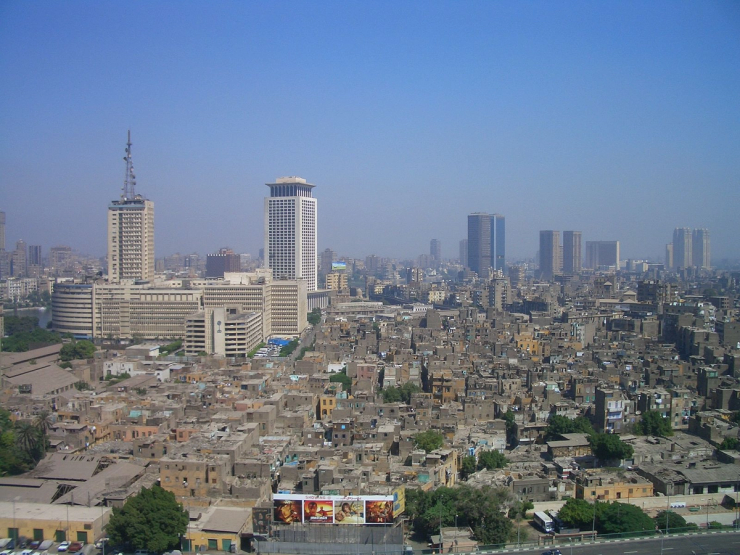The News
A Dubai-based billionaire’s plans to redevelop downtown Cairo with new streets and skyscrapers — an area akin to his home — is drawing a growing backlash in the Egyptian capital, where residents fear not simply the loss of a historic district’s character but the encroaching influence of the Gulf.
The plans by Mohamed Alabbar, the man behind Emaar Properties and the Burj Khalifa, include the redevelopment of up to 50 acres of central Cairo, with the businessman telling Al Arabiya Business that Dubai offers a model that Egypt could stand to replicate in order to cater to visitors. For a country heavily reliant on tourism and facing hefty debt burdens as well as languid economic growth, the upside is obvious.
Yet some Cairenes are skeptical, worried that the proposals will only exacerbate inequality, cater to elites, and increase Gulf influence over Egypt’s decision-making.
“People think skyscrapers equal wealth, but they ignore the economic and political structures that made Dubai successful,” Ahmed Zaazaa, an architect and urban designer assistant professor at Cairo’s Nile University, said. “Egypt is in a very different position.”
Ahmed’s view
Beyond the debates over what downtown Cairo will eventually look like are questions about growing Gulf involvement in Egypt’s economy, fueling concerns of an erosion of the country’s sovereignty.
Cairo has been looking to the Gulf to finance a much hoped-for economic revival.
Saudi Arabia pledged to invest $15 billion into Egypt following President Abdel Fattah el-Sisi’s visit to the kingdom last year, and has deposited $10 billion in Egypt’s central bank, while Doha is looking to pump $7.5 billion into the Arab world’s most populous nation.
The UAE has been the most aggressive, though, and much of the emirates’ attention has gone toward tourism — which accounts for 8% of GDP — and real estate. In Feb. 2024, Egypt signed a $35 billion deal with the Abu Dhabi Developmental Holding Company to develop Ras El Hekma, a lucrative Mediterranean coastal area. This agreement, the largest in Egypt’s modern history, is part of a broader effort to attract up to $150 billion in foreign investments.
“Over the past 15 years, Egypt’s reliance on Gulf financial support — largely driven by political alignment — has proven critical,” Amr Adly, an associate professor of political economy at the American University in Cairo, told me. He attributed this to Gulf monarchies, including the UAE, seeing it in their best interest “to support a stable and friendly political system in Egypt.”
The Gulf’s lifeline is critical to Egypt’s stability. But the fact that such support may ultimately alter Egypt’s national identity, erode its economic sovereignty, and allow foreign firms and powers to transform Cairo’s urban landscape is unsettling to many Egyptians.
Know More
The government has long planned to renovate Cairo’s historic center: Built in the late 19th century, downtown Cairo was modeled after European capitals, with wide boulevards and grand architecture. Over the years, economic and political shifts have transformed it from an elite enclave into a space filled with businesses, cultural landmarks, and working-class residents.
But Alabbar’s remarks — especially his reference to the controversial 1990s facelift of Beirut’s city center — sparked fears that redevelopment will strip the capital’s downtown of its vibrant character, ultimately catering primarily to elites. The Egyptian government downplayed his comments, saying Alabbar’s plan was one of multiple investment proposals it was reviewing for downtown Cairo. Prime Minister Mostafa Madbouly confirmed that as government ministries relocate in the coming years to the New Administrative Capital, their former buildings will be repurposed, with a focus on attracting high-end investments.
“In Beirut, the Solidere project turned the city center into a ghost town after business hours,” Zaazaa said. “A similar fate could await Cairo if exclusivity is prioritized over inclusivity.”
One longtime resident of downtown Cairo, Ismail Sharara, voiced another concern: “This will make downtown even more expensive without justification,” he said. “I’d rather the government keep ownership of downtown — it’s a national issue.”
Al Ismaelia for Real Estate Investment, the Egyptian company that since 2008 has led restoration efforts focused on preserving historic buildings, also distanced itself from Alabbar’s vision, emphasizing that the downtown area should not be transformed into “something it is not.”
“Heritage preservation is the foundation of our work,” an Al Ismaelia spokesperson said. “Our goal is to maintain downtown’s original architectural identity while revitalizing it for contemporary use.”
The View From Hungary
In Budapest, Alabbar’s $5.2 billion Mini Dubai project had also run into disagreements. The project promised the construction of the European Union’s tallest skyscraper, an intelligent waste management system, and smart city elements in residential and commercial towers, schools and malls. The city has pushed back against the plan, however, with its mayor saying the government should prioritize affordable housing over luxurious skyscrapers.
Room for Disagreement
Not everyone is opposed to a deep modernization of downtown Cairo. “Some displacement is inevitable,” said Mostafa Salem, the Egyptian founder of Dubai-based design studio Coconut, whose digital renderings of downtown Cairo have gone viral. “Many buildings are illegally occupied or used as warehouses. That’s not sustainable.”
And in any case, Egypt may not be in a place to reject Alabbar’s investment proposal. “There has been a clear decline in transparency regarding economic policies and public data in Egypt, which makes it difficult to assess how much control Egypt retains over agreements like this,” Adly, the American University of Cairo associate professor, noted.
This piece was published in collaboration with Egab.


